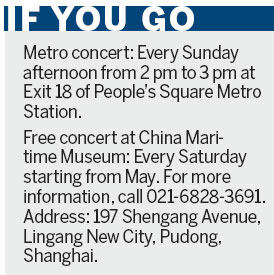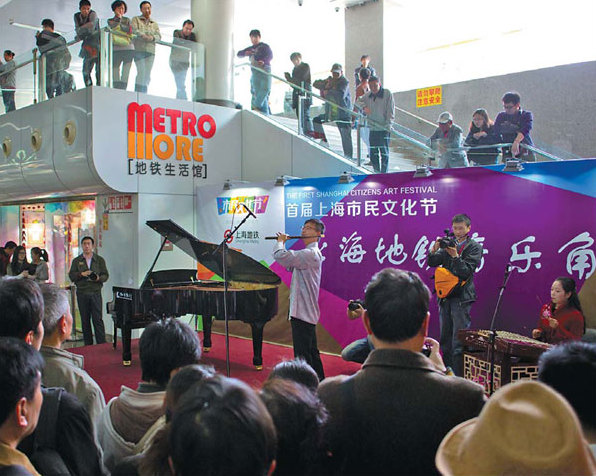
 'Taken 2' grabs movie box office crown
'Taken 2' grabs movie box office crown
 Rihanna's 'Diamonds' tops UK pop chart
Rihanna's 'Diamonds' tops UK pop chart
 Fans get look at vintage Rolling Stones
Fans get look at vintage Rolling Stones
 Celebrities attend Power of Women event
Celebrities attend Power of Women event
 Ang Lee breaks 'every rule' to make unlikely new Life of Pi film
Ang Lee breaks 'every rule' to make unlikely new Life of Pi film
 Rihanna almost thrown out of nightclub
Rihanna almost thrown out of nightclub
 'Dark Knight' wins weekend box office
'Dark Knight' wins weekend box office
 'Total Recall' stars gather in Beverly Hills
'Total Recall' stars gather in Beverly Hills
Music to the ears
Updated: 2013-05-27 05:36
By Shi Yingying (China Daily)
|
||||||||
|
Bamboo flutist Jin Kai from Shanghai Chinese Orchestra plays a solo concert for commuters at People's Square Metro Station in Shanghai. Gao Erqiang / China Daily |
Audiences no longer have to go to concert halls for performances, if they cannot afford it. They can now enjoy shows at metro stations, gardens and museums. Shi Yingying joins the crowd in Shanghai.
Free concerts in all possible forms imaginable have been a regular feature in the grand hall of the People's Square Metro Station in the heart of Shanghai since the start of the year. Free-style jazz piano solos, chamber music of classical sonatas, traditional Chinese bamboo flutes, you name it.
The noisy background, humming and whistling from curious commuters, instead of interrupting the shows, gives the atmosphere an unconventional sense of interactivity.
"It's the second time I'm watching a metro concert. It has a down-to-earth feel. For Chinese audiences, music, especially classical music, is considered high class. Free concerts like these bring it down to earth," says 21-year-old college student Bian Mengdan, who has never been to any formal performances.
The Hangzhou native, who's studying in Shanghai, says the first time, she was attracted by the jazz version of the popular song You Exist in My Song.
The song was played by American jazz pianist Robert Turner during his metro concert debut in January.
"They (audiences) prefer songs they know, songs they've heard before, no matter what it is - it could be classical, popular or jazz," says Turner, 37, who was invited to the city by the Shanghai Symphony Orchestra. The orchestra also suggested that he performed in the metro station.
"I don't want to play a song they don't feel anything about," Turner says, adding he plays more classic jazz onstage compared with his performance in the subway.
"I make that decision (selection of songs) based on the audience. The response I get helps me decide which song to play."
Turner's song list ranges from the jazz standards of Duke Ellington's Satin Doll to Oscar Peterson's Hymn to Freedom, the jazz version of the well-known Hey Jude and the locals' favorite The Moon Speaks for My Heart.
"The metro concert allows more space for free play and it reminds me of when I was 18 years old, we used to play where everybody shops with the keyboard set up and guitar case open. People put in a dollar or two when they passed by," he says.
Young classical pianist Ping Youzhi, who described herself as the type who is easily influenced by the surrounding environment, enjoyed playing for her new audience at the metro station. She played melodies such as Turkish March and For Elise.
"Usually you would dress up in formal dress code for classical concerts. You would not be late or walk out. But, it's a completely different experience to play in metro stations - some of the audience only stay for one piece and there are even some who stay only for a couple of seconds," she says.
Ping says she used to get angry with spectators who cough and make noise as "the most wonderful moment becomes interrupted for no reason and as a performer, you would get frustrated in such circumstances".
"But I never feel that way during metro concerts because the purpose is to educate the audience and let more people know about classical music," she says.
According to Feng Hao, spokesman for Shanghai Shentong Metro Group Co, operator of Shanghai Metro, more than 20 metro concerts have been held in People's Square station on Sunday afternoons since the program started more than four months ago.
Shanghai Symphony Orchestra offered excellent artists, referred to as "cultural volunteers", to roll out the concerts in January. In April, Shanghai Chinese Orchestra, which performs folk music, joined in, says Feng, adding the program won't be one-off event.
"We want it to be sustainable," he says.
Metro concerts attract not only music fans, curious passengers and nearby residents, but also those who arrive an hour early all the way from the other end of the city for their favorite artist. Cao Xinggui, 71, is one of them.
Cao, who used to play the traditional Chinese instrument pipa, a four-stringed Chinese lute, says he traveled a long way to hear Duan Ai'ai, the famous Chinese erhu player on April 21.
The retired worker was sent by his district's community folk orchestra to "learn from the expert".
"They (the rest of the community folk orchestra) will come next weekend," says Cao, adding the format of free concerts in metro stations makes it possible for ordinary people like him to meet professional musicians.
"I cannot afford the price of formal concerts and it's not convenient for us in our 70s to go to the ticket office, get the ticket and then go for the concert," he says. "The good thing about this free concert is that they don't do a sloppy job just because it's free. On the contrary, they take it seriously and do a good job."
In Shanghai, the metro station isn't the only public venue to hold such concerts. Audiences can bring blankets and picnic baskets to the relatively relaxed part of the city's Chenshan Botanical Garden to listen to performances. They can sit or lie on the lawn while listening to classical music and admiring the sunset.

At this year's Chenshan Botanical Garden concert, held on May 19, Prague Symphony Orchestra was one of the performers.
China Maritime Museum also announced its weekly Saturday concerts starting from May.
Wu Xinyi from Shanghai Shentong Metro Group Co, who's also in charge of metro concerts, however, expresses his concerns about coping with overcrowding in public concert venues such as metro stations.
"That's why we keep a close eye on passenger flow and control," says Wu, adding his team is sticking to a few principles such as never inviting celebrities (too many commuters will stop for them) and never bringing in a full symphony orchestra to the metro station.
"Safety concerns are also the reason why we're only having the concert in People's Square station - the venue is big enough."
Contact the writer at shiyingying@chinadaily.com.cn.
(China Daily 05/27/2013 page22)
Most Viewed
Editor's Picks

|

|

|

|

|

|
Today's Top News
Shenzhou X astronaut gives lecture today
US told to reassess duties on Chinese paper
Chinese seek greater share of satellite market
Russia rejects Obama's nuke cut proposal
US immigration bill sees Senate breakthrough
Brazilian cities revoke fare hikes
Moody's warns on China's local govt debt
Air quality in major cities drops in May
US Weekly

|

|









